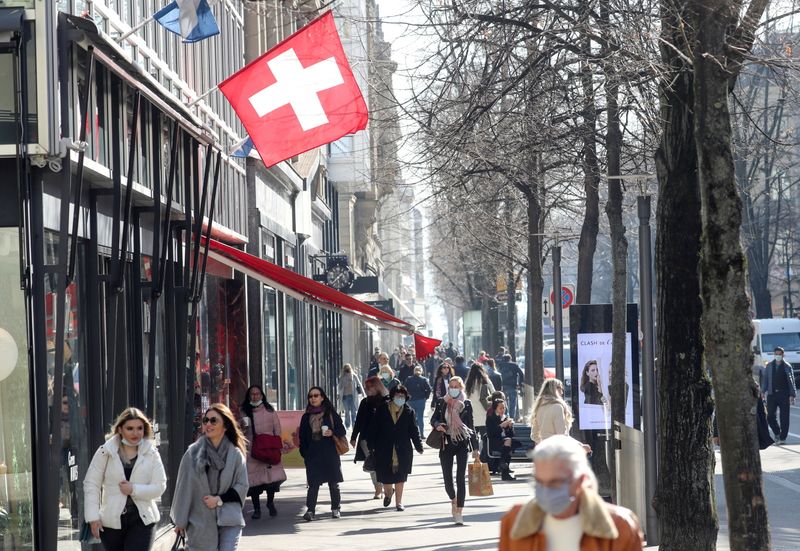
FILE PHOTO: Shoppers walk along the street after the Swiss government relaxed some of its COVID-19 restrictions, as the spread of the coronavirus disease continues, at the Bahnhofstrasse shopping street in Zurich, Switzerland March 1, 2021. REUTERS/Arnd Wiegmann/File Photo
December 9, 2021
ZURICH (Reuters) – Switzerland’s economy will grow by 3.3% this year and 3.0% in 2022, the government forecast on Thursday, adjusting its previous predictions as the coronavirus situation worsens and restrictions tighten across Europe.
The government, which had previously forecast the economy to grow by 3.2% this year and 3.4% in 2022, said the economic upturn would be slowed but not halted provided the pandemic situation did not deteriorate further.
In its first forecast for 2023, the State Secretariat for Economic Affairs (SECO) said it expects the Swiss economy to grow by 2%, still above the average growth rate of around 1.7%.
“Supply bottlenecks and stricter COVID-19 measures are putting a strain on the economy internationally in winter 2021/22,” SECO said.
Still, factors which have slowed the recovery should become less apparent during 2022, it said, as consumer spending and investment returned and exports recovered.
“Provided there are no severely restrictive health policy measures, such as broad business lockdowns, economic recovery is not expected to come to a standstill in the medium term,” SECO said.
The forecast is the latest downgrade to the Swiss economic outlook, following declines in the purchasing managers index and the KOF economic barometer.
The number of coronavirus cases has surged in Switzerland in recent weeks while the Omicron variant has also arrived, prompting the government to tighten its restrictions.
Neighboring Germany has imposed curbs on the unvaccinated, while Austria launched a new lockdown. England has also brought in tougher restrictions to slow the spread of the Omicron coronavirus variant.
The strengthening Swiss franc makes exports more expensive, while rising raw materials costs and shortages of components like semiconductor chips are also weighing on growth.
The Swiss National Bank, which has been battling the appreciation of the franc, is due to make its latest interest rates decision next week.
(Reporting by John Revill)

